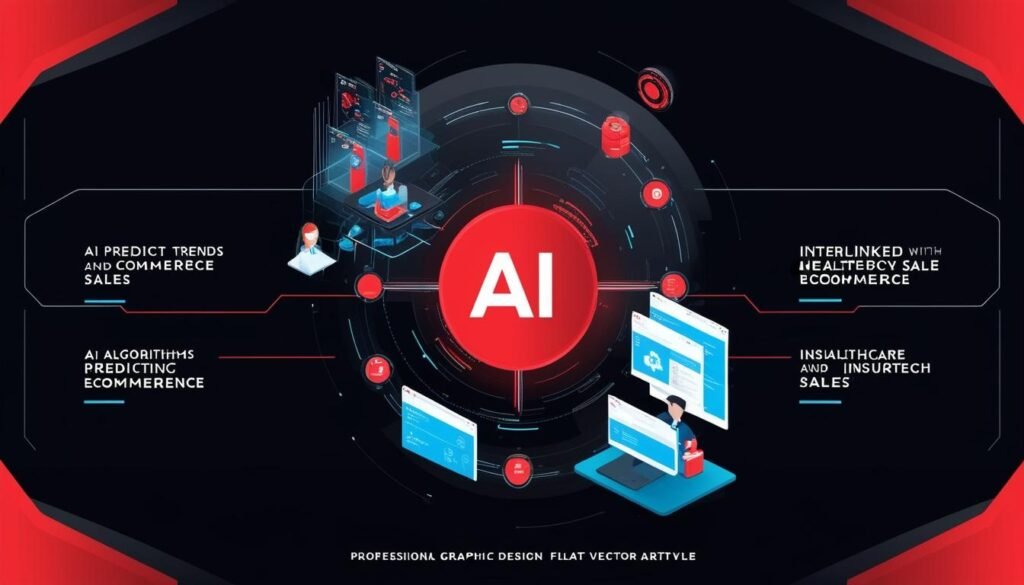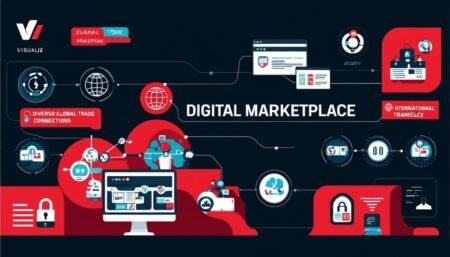Businesses across various sectors are embracing artificial intelligence and automation to improve efficiencies and customer experiences, transforming their operational strategies.
In various sectors, including eCommerce, healthcare, and insurance, businesses are increasingly utilising artificial intelligence (AI) and automation to refine operations and enhance decision-making processes. These technological advancements are paving the way for more effective management strategies, improved efficiency, and better customer experiences.
In the eCommerce domain, predictive analytics has emerged as a crucial tool for enhancing decision-making. As articulated by Prem Bhatia, CEO and Co-Founder of Graas, in an article for Express Computer, predictive analytics enables businesses to not only track historical performance but also to anticipate future trends and understand customer behaviour. Despite the significant potential of predictive analytics, Bhatia notes that many eCommerce companies still rely primarily on historical data, which only addresses past performance without providing insights into future dynamics.
One of the prevalent applications of predictive analytics is in demand forecasting. Accurate forecasts are imperative in the competitive eCommerce landscape, where profit margins can be incredibly slim. By integrating various factors such as advertising spend, competitive intelligence, and specific marketing calendars, businesses can create sophisticated forecasting models that enhance the precision of their predictions. These models can simulate different strategies, providing insights that directly influence business strategies and potentially drive sales growth.
Additionally, dynamic pricing represents another impactful use of predictive analytics in eCommerce. By leveraging real-time data, companies can adjust pricing based on demand forecasts, thus optimising sales while maximising profit margins. For instance, brands can raise prices on high-demand products while providing discounts on slower-moving items, creating a comprehensive pricing strategy that reflects market conditions.
From a different perspective, the healthcare sector is undergoing a significant transformation as well, primarily through the automation and artificial intelligence-driven innovations in revenue cycle management (RCM). Vijayashree Natarajan, SVP and Head of Technology at Omega Healthcare, highlighted in Express Computer how AI is reshaping RCM processes, incorporating data analytics and machine learning to enhance operational efficiency.
AI tools are particularly effective in claims processing, where they can detect errors and ensure compliance, thereby reducing claim rejection rates and speeding up reimbursement times for healthcare providers. This is especially vital in healthcare, where financial sustainability is closely tied to the speed and accuracy of revenue flows. Furthermore, AI’s application in predictive intelligence allows organisations to foresee potential bottlenecks in billing cycles, effectively enabling proactive management of cash flow.
Automation is also significantly enhancing RCM by streamlining laborious tasks such as payment posting and patient billing. Automated systems can efficiently manage invoicing and follow-ups, drastically cutting down on administrative burdens and accelerating payment cycles. These improvements enable healthcare providers to recapture revenue swiftly while preventing leaks caused by administrative errors.
In the insurance sector, a transformation is driven by InsurTech, integrating AI, automation, and advanced analytics into traditional insurance frameworks. Insurance companies are leveraging these technologies to enhance their operations and provide more personalised services to consumers. According to a piece by TechBullion, AI plays a crucial role in underwriting by automating data evaluation and improving risk assessments.
AI’s influence extends to claims processing, enabling quicker validation of claims and identification of fraudulent activities. The use of automation within insurance streamlines routine tasks, thereby allowing insurers to focus on more critical aspects of customer service. The integration of data analytics further enables insurers to make informed decisions based on customer behaviour, improving risk management through predictive analytics.
Moreover, emerging technologies like blockchain are also finding applications in the insurance realm, improving transparency and trust in transactions. Blockchain’s decentralised records enhance the security of sensitive data, which is crucial in insurance where fraud is prevalent. As this sector continues to evolve, InsurTech is set to redefine insurance practices, creating a more efficient and customer-centric model.
In summary, the application of AI and automation is reshaping various business sectors. Through the use of predictive analytics in eCommerce, RCM innovations in healthcare, and the rise of InsurTech within insurance, companies are harnessing these technologies to drive operational efficiency, improve customer service, and ultimately achieve substantial growth. As these advancements progress, they promise to significantly alter the landscape of their respective industries, delivering enhanced value for businesses and consumers alike.
Source: Noah Wire Services
- https://www.techtarget.com/searchenterpriseai/feature/6-key-benefits-of-AI-for-business – Corroborates the use of AI in various sectors to enhance decision-making, improve efficiency, and better customer experiences.
- https://acropolium.com/blog/ai-use-cases-in-major-industries-elevate-your-business-with-disruptive-technology/ – Supports the application of predictive analytics in eCommerce for demand forecasting and dynamic pricing.
- https://www.leewayhertz.com/ai-use-cases-and-applications/ – Details the use of AI in eCommerce for predictive analytics, including demand forecasting and dynamic pricing strategies.
- https://business.fiu.edu/academics/graduate/insights/posts/competitive-advantage-of-using-ai-in-business.html – Explains how AI enhances decision-making in eCommerce through predictive analytics and data-driven insights.
- https://www.newhorizons.com/resources/blog/benefits-of-ai-for-business – Highlights the role of predictive analytics in eCommerce for improving decision-making and optimizing inventory management.
- https://acropolium.com/blog/ai-use-cases-in-major-industries-elevate-your-business-with-disruptive-technology/ – Discusses the automation and AI-driven innovations in revenue cycle management (RCM) in the healthcare sector.
- https://www.leewayhertz.com/ai-use-cases-and-applications/ – Details AI’s application in healthcare, particularly in claims processing and predictive intelligence for RCM.
- https://www.techtarget.com/searchenterpriseai/feature/6-key-benefits-of-AI-for-business – Supports the use of AI in healthcare for enhancing operational efficiency and reducing administrative burdens.
- https://business.fiu.edu/academics/graduate/insights/posts/competitive-advantage-of-using-ai-in-business.html – Explains how automation and AI streamline laborious tasks in healthcare RCM, such as payment posting and patient billing.
- https://acropolium.com/blog/ai-use-cases-in-major-industries-elevate-your-business-with-disruptive-technology/ – Describes the integration of AI, automation, and advanced analytics in the insurance sector, particularly in underwriting and claims processing.
- https://www.leewayhertz.com/ai-use-cases-and-applications/ – Details the use of AI in insurance for risk management through predictive analytics and the validation of claims.
- https://news.google.com/rss/articles/CBMioAFBVV95cUxOa2YxOHZGbEFGc2xGdVZXUXpTM2xDRXZIUXFNUkF6M1dHTFUzNndRYzNIZ2RYaHhiNW9JSktLRnNZaFhKR0FRV2owcmN1RmtjWGhQT1RXeVRhOE9DOTZsd0JUdTY5Z1VKU0FiaUtleWNURkhPa2ViSkpfYm90N1h2ckhCRnAyMjlIdEFVVU82UzNsVWtRTTdQWEoyaWRvNl9F0gGmAUFVX3lxTE5Vd0w0bjdhY2JMMVlwUDBLY2lzUjRoN3NHb0dlQURxcE9xYlRKVHl5dDRDSTJScHFzVUYwaGRKV1NOV2dCdjgyYVJJTFBjS3BWNm1WOG1lc3hxM0hhemptT1ZCbEd5LXBxN3dTbEhmVF9Hbi1vb09zeHB5eF9FT2dCNkdwaE8yODVFNTdDMnNoTGdYNm9PNDQwYUl5bnN2VUZvcFpDVlE?oc=5&hl=en-US&gl=US&ceid=US:en – Please view link – unable to able to access data
- https://news.google.com/rss/articles/CBMi4wFBVV95cUxQWW9hS2lkOHdhWFZXNHBKQl9ocWJzWHgwRjJDZkRzNmc3S3hHZF8tRXBjbThRZUdFSzBHY2sxNlFIUUFLSmYtR2tCaExoa2ZQcm9ZRXROTElXNGFMSFpDU2Y5QVpfTkNmbjE0d3RyTDIwVTNnZURRa1NUTFQwWG81c3RxMHgwTG8xTDFtZGpHN3hNeUtzc1hvWS01VUNrRFVaTW9pN0Q1TDFHemtUbTNSc1d6dDdIMlA3cmJqbmxUTDBxcjRSM043VHRiZ1pibHNXdWdwZTJoeGFEUlZKWHY5M3diZ9IB6AFBVV95cUxNQ0EzVERFQjF0cnZFQWVUbWh2LWY2TXpyVWlrTDJIelFldXg4dmxaSnhHdVNNTDA3RUEtXzUxdUE2VGR5TXF2WWR1cVRrMGdIRVpRT3BRNnhwMGlGcmpXMkVhdkRIcUxwbUxveTl5UHB1QTNRZHJxb2RsS0JwQ3dOaUh1X3EwelVNWUdkOHhzN1lzNXpVcTVzN3VtY3hVbXRoXzNWbTFBN25mTWJudnRPdUJ4V1RzTFN5OXN4VDVWQkZlY3FUdXRNSlM0aHlqU1Y5dGtINVNuVklSamRPeXZmUTBxQzZyNzBi?oc=5&hl=en-US&gl=US&ceid=US:en – Please view link – unable to able to access data
















